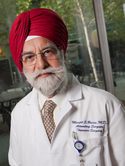A phase II trial of paclitaxel and cisplatin in patients with locally advanced metastatic esophageal cancer: A preliminary report Journal Article
| Authors: | Kelsen, D.; Ginsberg, R.; Bains, M.; Cooper, J.; Arquette, M.; Forastiere, A. A.; Ilson, D. |
| Article Title: | A phase II trial of paclitaxel and cisplatin in patients with locally advanced metastatic esophageal cancer: A preliminary report |
| Abstract: | We demonstrated in an earlier trial that paclitaxel (Taxol; Bristol- Myers Squibb Company, Princeton, NJ) has substantial antineoplastic activity, with acceptable toxicity, in patients with advanced metastatic esophageal cancer. Preclinical and clinical data from studies in other tumors indicate substantial additive or even synergistic activity for paclitaxel/cisplatin combination chemotherapy. We encountered substantial toxicity with a cisplatin/paclitaxel/5-fluorouracil combination. To maximize paclitaxel dose, we initiated a phase II trial using cisplatin and paclitaxel alone. This report summarizes preliminary data from that trial. Paclitaxel 200 mg/m2 is given as a continuous, 24-hour infusion on day 1. On day 2, cisplatin 75 mg/m2 is given. Courses are repeated every 21 days. Dose adjustments are based on myelosuppression, neurotoxicity, and (for cisplatin) renal or auditory toxicity. All patients receive recombinant human granulocyte colony- stimulating factor to minimize the risk of neutropenic fever. The primary end point of the study is tumor regression. Secondary end points include duration of response and toxicity. Two groups of patients are being studied. Those with advanced metastatic disease receive chemotherapy alone as palliative treatment. The second group has locoregional disease that is potentially resectable. These patients receive combined-modality therapy involving induction paclitaxel/cisplatin chemotherapy followed by surgery. To date, 37 evaluable patients have been treated. Twenty had advanced metastatic disease and 17 were treated before planned surgery. Twenty-seven patients had adenocarcinoma and 10 had epidermoid carcinoma. Major objective responses were seen in 49% of all patients, with similar response rates for patients with metastatic and locoregional disease. The median duration of response for patients with metastases is 4+ months. Among 14 patients treated before surgery, one experienced a complete pathologic response, and the neoplasms of 43% were downstaged. Primary toxicity was neutropenia, which was tolerable. Surgical morbidity or mortality did not increase. Cisplatin plus paclitaxel is an active combination in the treatment of patients with advanced or locoregional esophageal cancer. Further studies with this combination both in metastatic and locally advanced disease are indicated. |
| Keywords: | adult; clinical article; controlled study; treatment outcome; aged; middle aged; clinical trial; fatigue; neutropenia; cisplatin; fluorouracil; cancer combination chemotherapy; drug potentiation; gemcitabine; paclitaxel; combined modality therapy; neurotoxicity; nephrotoxicity; phase 2 clinical trial; bone marrow suppression; antineoplastic combined chemotherapy protocols; dexamethasone; hemoglobin; antineoplastic activity; fever; neoplasm metastasis; blood cell count; recombinant granulocyte colony stimulating factor; esophagus cancer; esophageal neoplasms; intravenous drug administration; oral drug administration; diphenhydramine; premedication; ototoxicity; cimetidine; raltitrexed; subcutaneous drug administration; humans; human; male; female; priority journal; article |
| Journal Title: | Seminars in Oncology |
| Volume: | 24 |
| Issue: | 6 Suppl. 19 |
| ISSN: | 0093-7754 |
| Publisher: | Elsevier Inc. |
| Date Published: | 1997-12-01 |
| Start Page: | S19-77 |
| End Page: | S19-81 |
| Language: | English |
| PUBMED: | 9427272 |
| PROVIDER: | scopus |
| DOI/URL: | |
| Notes: | Article -- Export Date: 17 March 2017 -- Source: Scopus |
Citation Impact
Related MSK Work






